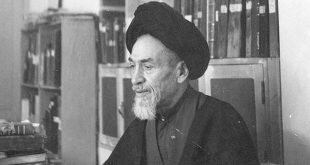
It has been said that when Ayatollah Sayyed Kamāl al-Ḥaydarῑ attended the Baḥth ‘al-Khārej lessons of Ayatollah Sayyed Muḥammad Bāqir ‘al-Ṣadr, he – S. Kamāl – was not wearing a turban and it was then when Sayyed ‘al-Ṣadr requested from him to wear the turban so that his attendance becomes formal.
This is in regards to his study of jurisprudence (ʾal-fiqh) and the principle of jurisprudence (ʾusul ʾal-fiqh.) As for his philosophical and theological interests, he attempted to nourish them by attending the lessons of Sayyed Muslim ʾal-Ḥellī and Sheikh ʿAbbas ʾal-Qochānī[1].
Emigration to Kuwait
From the beginning of the year 1983, Sayyed Kamāl pursued his Ḥawza studies on all levels. He attended Ayatollah ʾal-ʿUthma Sheikh Waḥīd ʾal-Khorāsānī’s lectures from the beginning of the subject of qatʿ and until the end of the course on ʾUsul (principles of Islamic jurisprudence). He also attended the entire study of the subject of “ṣalāt” in the jurisprudential field under Ayatollah ʾal-ʿUthma Sheikh Waḥīd ʾal-Khorāsānī’s for six years. He also attended the lessons of Ayaotllah ʾal-ʿUthma Sheikh Mīrzā Jawād Tabrīzī for two years.
In addition to studying under these two scholars, he also attended Baḥth Khārij in the book of ʾal-makāsib under Sheikh Mourtadha ʾal-Ḥāʾerī, the son of Sheikh ʿAbdulKarīm ʾal-Hāʾerī (the founder of the Islamic Seminary in the holy city of Qum).
As for the philosophical and gnosis (‘irfan) arena, he pursued his educational journey by attending the lessons of a group of the most profound and prominent scholars such as his eminence Ayatollah Sheikh Jawādi ʾAmolī (dt) and his eminence Ayatollah Sheikh Ḥassan Zāda ʾAmolī (dt). He also benefited from attending the lessons and lectures of Ayatollah Mesbāḥ Yazdī (dt).
Teaching
1. ʾal-Lumʿa ʾad-Dimashqiyya (Consists of 345 Lessons)
2. ʾal-Makāseb ʾal-Muḥarrama (consists of 187 lessons)
3. Kītāb-ul-bayʿ (consists of 229 lessons).
4. Khārij ʾal-Makāsib (consists of 60 lessons).
The Principles of Islamic Jurisprudence
1. The three volumes of Sayyed Muhammad Baqir al-Sadr’s principles of Islamic Jurisprudence (consists of 404 lessons)
2. The general principles of comparative jurisprudence for Sayyed Muhammad Taqi al-Hakim (consists of 70 lessons).
3. Treatises of Shaykh al-a’tham. The topic of definiteness. (consists of 90 lessons).
4. Kharej al-Usul (400 lessons -still ongoing).
Islamic Philosophy
1. Bidayat ʾal-Ḥikma, Sayyed Muḥammad Ḥusayn Ṭabeṭabaʾī (116 lessons).
2. Nihayat ʾal-Ḥikma, Sayyed Muḥammad Ḥusayn Ṭabeṭabaʾī Tabetabaei (335 lessons).
3. ʾal-Manhaj ʾal-Jadīd fī taʾlīm ʾal-falsafa[2], Ayatollah Sheikh Mesbāḥ Yazdī (168 lessons).
4. The chapter of “the self” from ʾal-manẓuma by Mulla Hādī Sabzawārī (70 lessons).
5. ʾal-ʾAsfar ʾal-ʿqaliya ʾal-ʾarbʿa, volume 1, Mulla Sadra (372 lessons).
6. ʾal-ʾAsfar ʾal-ʿqaliya ʾal-ʾarbʿa, volume 9, Mulla Sadra (240 lessons).
7. ʾal-ʾAsfar ʾal-ʿqaliya ʾal-ʾarbʿa, volume 2, Mulla Sadra (ongoing lessons).
8. ʾal-ʾAsfar ʾal-ʿqaliya ʾal-ʾarbʿa, volume 6, Mulla Sadra (ongoing lessons).
Logic
1. The book of logic by Sheikh Muẓaffar (105 lessons).
Islamic Theology
1. ʾal-Bāb ʾal-Ḥādī ʿashar (30 lessons).
2. Lessons on the Doctrine of Divine Unity (117 lessons).
3. Lessons on Divine Justice (118 lessons).
4. Lessons on Imammate (174 lessons).
‘irfan (Gnosticism)
1. Tamhīdʾ al-Qawāʿed by ʾIbn Turkah ʾal-ʾisfahānī (168 lessons).
2. Fusus ʾal-Ḥikam[3] (ongoing lessons).
Exegesis of the Holy Qur’an
1. Introductions to the exegesis of the Qur’an (18 lessons).
2. The exegesis of the opening chapter of the holy Qur’an (17 lessons).
3. The exegesis of Ayatul-Kursi (64 lessons).
4. The exegesis of ʾāli-ʾimrān (The Family of Imran) – (64 lessons).
5. The exegesis of the chapter of Yusuf (Joseph) – (35 lessons).
6. Miscellaneous lectures on exegesis (of the Qur’an) such as “the self”, “intercession”, “miracles”, and “the perfect man.” (120 lessons).
Ethics and Self-discipline
1. Explanatory lessons on the book “Jihad al-Akbar” by Imam Khomeini (40 lessons).
2. Various lectures regarding piety.
 Ijtihad Network Being Wise and Faithful Muslim in the Contemporary World
Ijtihad Network Being Wise and Faithful Muslim in the Contemporary World
